Unit 6 Electricity Grammar&speak up课件
文档属性
| 名称 | Unit 6 Electricity Grammar&speak up课件 | 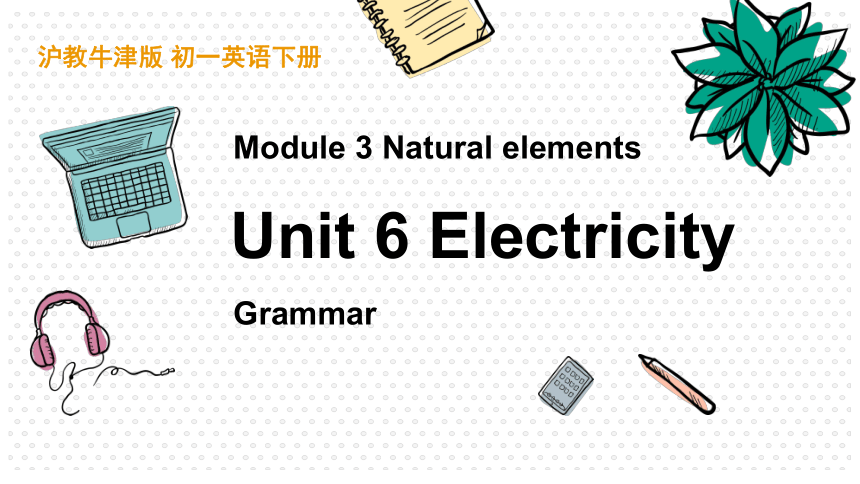 | |
| 格式 | pptx | ||
| 文件大小 | 22.8MB | ||
| 资源类型 | 试卷 | ||
| 版本资源 | 牛津深圳版 | ||
| 科目 | 英语 | ||
| 更新时间 | 2023-02-17 16:38:11 | ||
图片预览

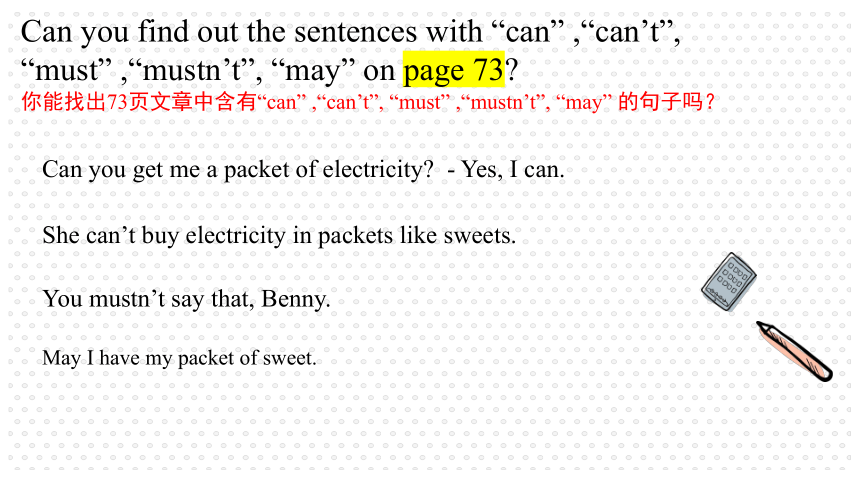
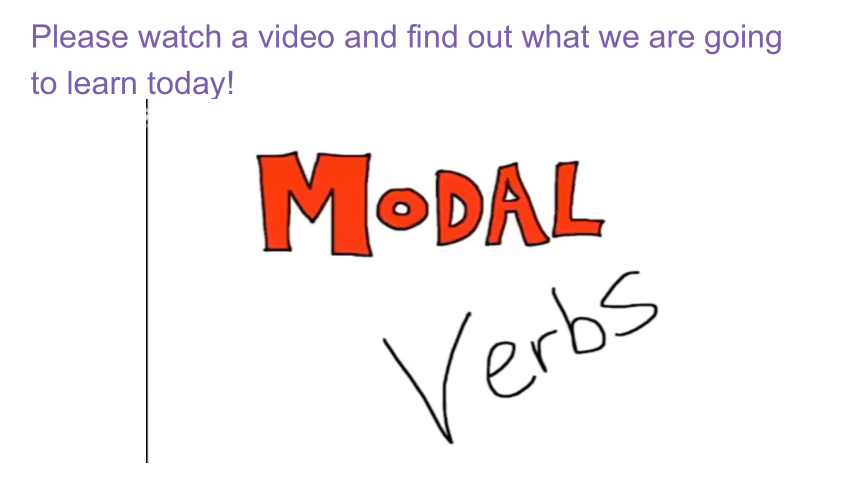
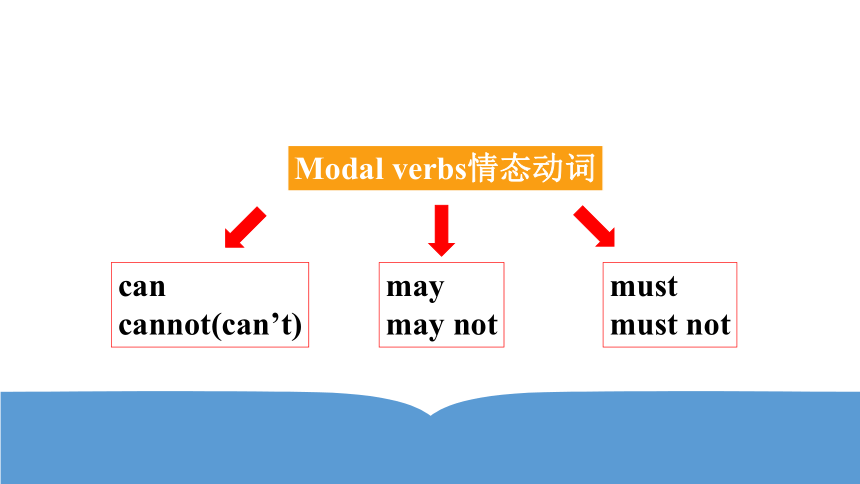
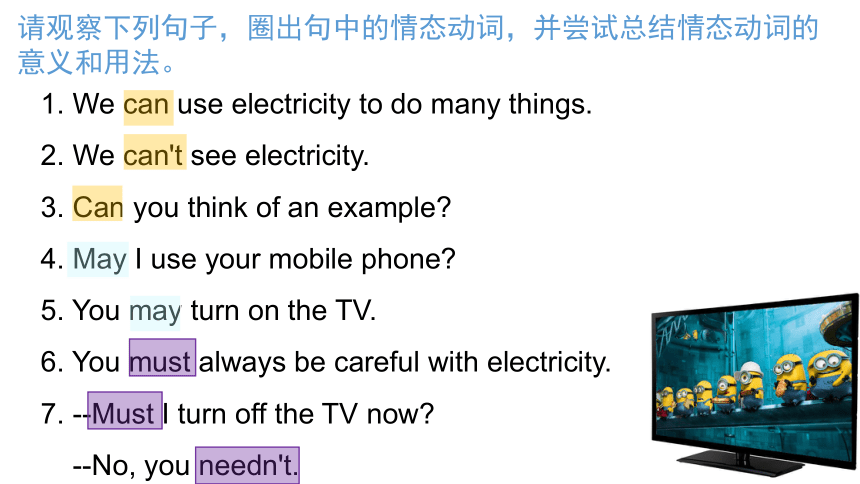
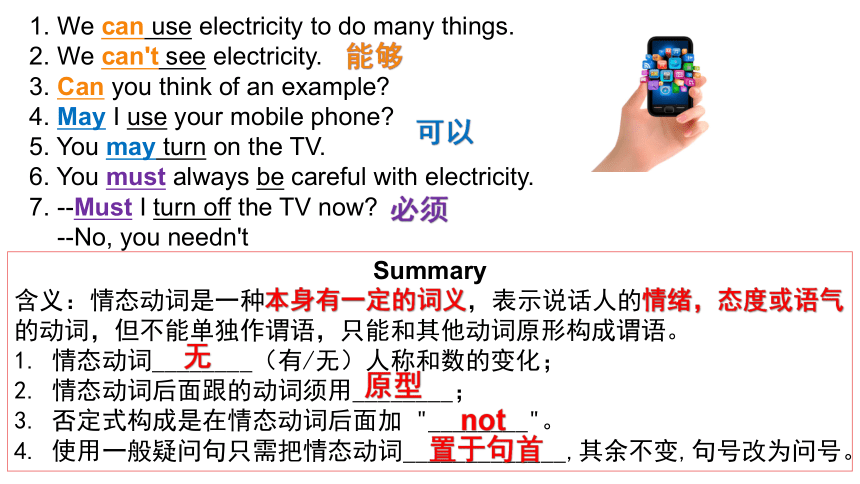
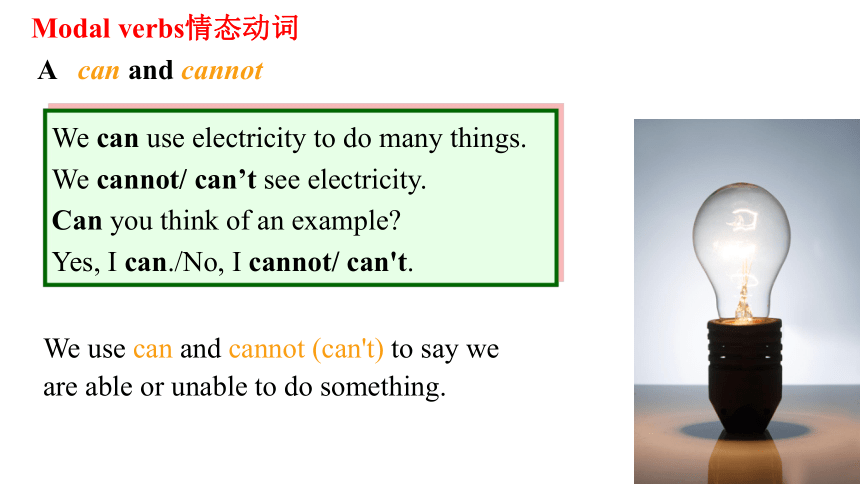
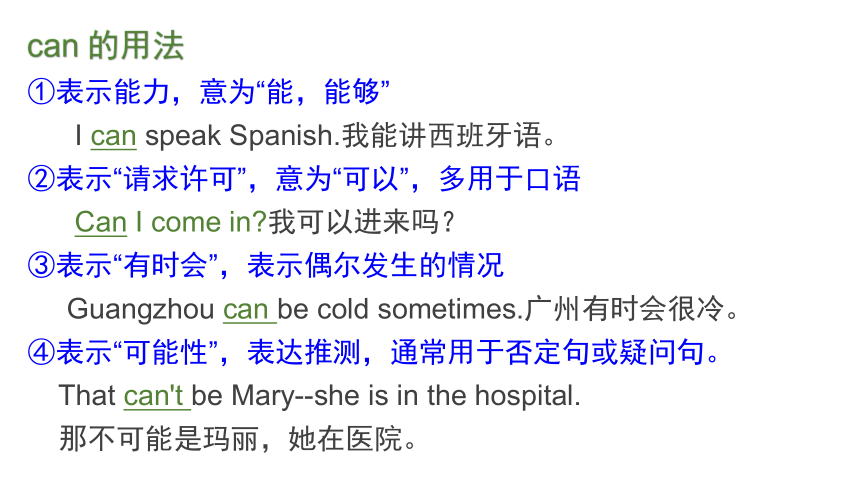
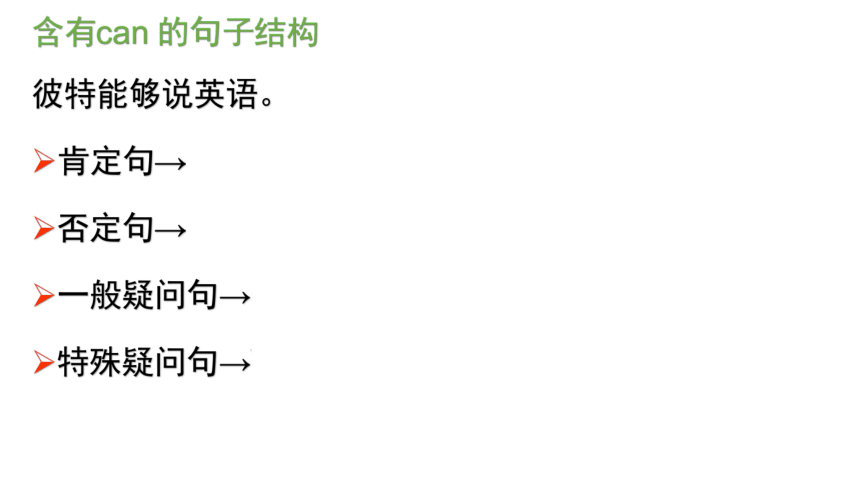

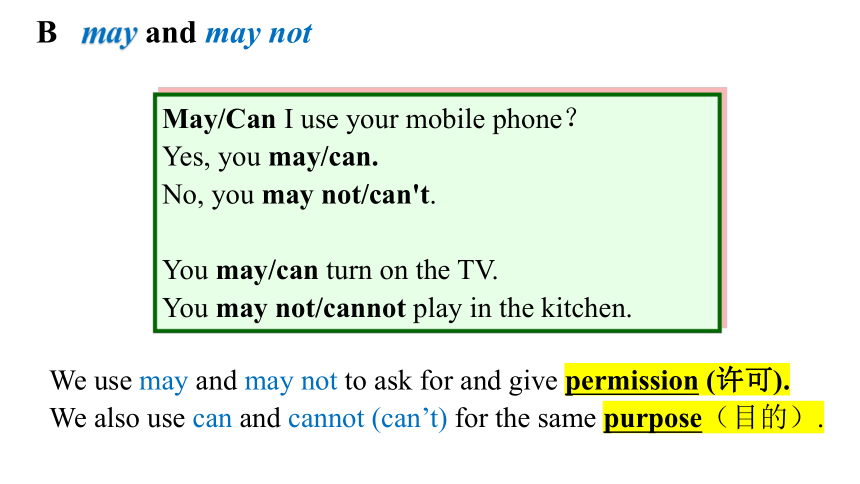

文档简介
(共43张PPT)
Unit 6 Electricity
沪教牛津版 初一英语下册
Module 3 Natural elements
Grammar
Can you find out the sentences with “can” ,“can’t”, “must” ,“mustn’t”, “may” on page 73
你能找出73页文章中含有“can” ,“can’t”, “must” ,“mustn’t”, “may” 的句子吗?
Can you get me a packet of electricity - Yes, I can.
She can’t buy electricity in packets like sweets.
You mustn’t say that, Benny.
May I have my packet of sweet.
Please watch a video and find out what we are going to learn today!
Modal verbs情态动词
can
cannot(can’t)
may
may not
must
must not
请观察下列句子,圈出句中的情态动词,并尝试总结情态动词的意义和用法。
1. We can use electricity to do many things.
2. We can't see electricity.
3. Can you think of an example
4. May I use your mobile phone
5. You may turn on the TV.
6. You must always be careful with electricity.
7. --Must I turn off the TV now
--No, you needn't.
1. We can use electricity to do many things.
2. We can't see electricity.
3. Can you think of an example
4. May I use your mobile phone
5. You may turn on the TV.
6. You must always be careful with electricity.
7. --Must I turn off the TV now
--No, you needn't
Summary
含义:情态动词是一种本身有一定的词义,表示说话人的情绪,态度或语气的动词,但不能单独作谓语,只能和其他动词原形构成谓语。
1. 情态动词________(有/无)人称和数的变化;
2. 情态动词后面跟的动词须用________;
3. 否定式构成是在情态动词后面加 "________"。
4. 使用一般疑问句只需把情态动词_____________,其余不变,句号改为问号。
无
原型
not
能够
可以
必须
置于句首
A can and cannot
We can use electricity to do many things.
We cannot/ can’t see electricity.
Can you think of an example
Yes, I can./No, I cannot/ can't.
Modal verbs情态动词
We use can and cannot (can't) to say we are able or unable to do something.
can 的用法
①表示能力,意为“能,能够”
I can speak Spanish.我能讲西班牙语。
②表示“请求许可”,意为“可以”,多用于口语
Can I come in 我可以进来吗?
③表示“有时会”,表示偶尔发生的情况
Guangzhou can be cold sometimes.广州有时会很冷。
④表示“可能性”,表达推测,通常用于否定句或疑问句。
That can't be Mary--she is in the hospital.
那不可能是玛丽,她在医院。
彼特能够说英语。
肯定句→Peter can speak English.
否定句→Peter can’t/cannot speak English.
一般疑问句→Can Peter speak English
特殊疑问句→What can Peter speak
含有can 的句子结构
Hi and Lo are talking about themselves. What are they saying Read their conversation and then complete the statements below with can or cannot.(P77)
1. Hi _____ play football.
2. Lo _____ paint.
3. Hi _____ speak as many languages as Lo.
4. Both Hi and Lo _____ dance.
5. Lo _____ drive a car, but he _____ play chess.
6. Hi ____ swim, but he _____ play the guitar.
can
can
can
can
cannot
cannot
cannot
cannot
May/Can I use your mobile phone?
Yes, you may/can.
No, you may not/can't.
You may/can turn on the TV.
You may not/cannot play in the kitchen.
B may and may not
We use may and may not to ask for and give permission (许可). We also use can and cannot (can’t) for the same purpose(目的).
— May I use your phone
— No, you can't.
—— 我可以借你的手机吗?
—— 不,你不可以。
①表示请求同意,意为“可以”,用于疑问句中。
Anna may know my phone number.
安娜可能知道我的电话号码。
②表示可能性。may表示的可能性比can小。
may的用法
注意:may构成的一般疑问句及其回答形式如下:
我可以在这里拍照吗?
May I take photos here
— (肯定回答) Yes, you may / can.
— (否定回答) No, you may not / can’t /mustn’t.
(注:mustn’t 的语气最强,表示禁止)
Daisy is not feeling well today. Benny is at home with her. Read their conversation below. Fill in the blanks with may or can.
Daisy is not feeling well today. Benny is at home with her. Read their conversation below. Fill in the blanks with may or can.
Benny: How are you feeling, Daisy
Daisy: Not very well.
Benny: _________ I get you a chair
Daisy: Yes, thanks.
Benny: I’m going out. _____ I borrow your bicycle,
Daisy
Daisy: Yes, you may. Before you go to meet your friends,
can you come and see the doctor with me
Benny: Yes. I ____. ______ I carry your bag for you
Daisy: Yes, that’s very kind of you, Benny.
I’m ready to go.________ you open the door for me
Benny: Yes, I can.
Daisy: Thanks.
May
May
Can
Can
May/Can
C must and must not
You must not/mustn't do that, Benny!
We must always be careful with electricity.
They must not/mustn't play near the heater.
We use must and must not/mustn't to tell people what to do or what not to do.
What do these signs mean
You mustn’t smoke here.
You mustn’t fish here.
You mustn’t use your mobile phone here.
You mustn’t take photos.
①表示规定,命令,强制,意为“必须;一定”,多指现在或将来的情况,指说话人的主观语气,其否定形式表示”禁止“。
如:
你必须先做作业。
You must do your homework first.
你不许在这里吸烟。
You mustn’t smoke here.
must的用法
②表示猜测,意为“一定是”,“准是”,常指有根据的,比较有把握的推测,仅用于肯定句。
Jack and Dick must be twins. They look so much alike!
杰克和迪克准是双胞胎,他们长得太像了。
注意:
must 构成的一般疑问句及其回答形式如下:
我必须现在交作业吗?
— Must I hand in the homework now
— (肯定回答) Yes, you must.
— (否定回答) No, you needn’t./No, you don't have to.
辨析must和have to
意义 形式 用法
must “必须;一定” 只有must 强调客观上必须做某事
have to “ 不得不;必须” have有各种时态和数 强调主观上不得不做某事
辨析must和have to
Daisy saw a doctor. The doctor told her what to do and what not to do. Help her write down the doctor’s instructions.
drink more water go to bed early
eat cold food share cups with others
go out alone take the medicine on time
I must drink more water.
______________________________
______________________________
I must not _____________________
______________________________
______________________________
I must go to bed early.
I must take the medicine on time.
eat cold food.
I must not go out alone.
I must not share cups with others.
I want to drink some water, Mr. Brown.
Can I drink some water, Mr. Brown
I want to have a look at your photos.
May I have a look at your photos
Pass me that book on the table.
Could you pass me that book on the table
We go for a walk after dinner.
We should go for a walk after dinner.
Let’s go now.
Shall we go now
Can I drink some water, Mr. Brown
May I have a look at your photos
Could you pass me that book on the table
We should go for a walk after dinner.
Shall we go now
I want to drink some water, Mr. Brown.
I want to have a look at your photos.
Pass me that book on the table
We go for a walk after dinner.
Let’s go now.
表许可
表推测
表过去
更委婉
表许可
表能力
表推测
can
could
表过去
更委婉
may
might
表许可
表建议
表要求
更建议
表推测
shall
should
第1组:委婉特工队
不得不
更客观
表要求
表推测
must
have to
表需要
表推测
need
第2组:义务特工队
情态动词 用法 否定形式及含义 疑问句及回答 共同点
can 表示具有某种能力,意为“能”,非正式场合也可以表示许可,相当于“may“ cannot/can't 不能 --Can... --Yes,...can. --No,...can't. 情态动词后要使用动词原形
may 表示请求,允许,意为“可以” may not 不可以 --May... --Yes,...may. --No,...may not/ can't/mustn't. must 用来指定规则或者发出命令,意为”必须“ must not/mustn't 禁止 --Must... --Yes,...must. --No,...needn't/don't have to. Speak up
cover the meat
lock the door
switch off the electricity
test the water
tidy up
______change the bulb
For example:
Jonny: May I change the bulb
Dad: No, you may not. You must switch off the
electricity. Then you may change the bulb.
Johnny’s father is talking to Johnny about safety at home. Work in pairs. S1 is Johnny. S2 is Dad.Johnny的爸爸正在谈论家里的安全问题,请以小组为单位进行对话。
cover the meat
lock the door
switch off the electricity
test the water
tidy up
______ put the meat in the fridge
S1: put the meat in the fridge
S2: . You must . Then
you may put the meat in the fridge.
May I
No, you may not
cover the meat.
cover the meat
lock the door
switch off the electricity
test the water
tidy up
______ go to bed
S1: go to bed
S2: . You must . Then you may go to bed.
May I
No, you may not
lock the door
cover the meat
lock the door
switch off the electricity
test the water
tidy up
______ take a bath now
S1: take a bath now
S2: . You must . Then
you may take a bath .
May I
No, you may not.
test the water
cover the meat
lock the door
switch off the electricity
test the water
tidy up
______ go out now
S1: go out now
S2: .You must . Then you
may go out.
May I
No, you may not.
tidy up
switch off the electricity
switch off= turn off 关( 电灯、机器等) switch on = turn on 打开
注意:switch on/ off 开/关,这个短语只能用于与电有关的开关,不能用于水龙头之类的开关
tidy up 整理好
名词放中后,代词放中间
轮到你打扫房间了。
It's your turn to tidy up the room.
约翰,你的卧室太脏了,记得整理好它。
John, your bedroom is too dirty; remember to tidy it up.
易错题
( )1. —Tom,you have to ______ the TV and go to bed quickly. It's too late.
—OK, I will.
A. switch off B. get off C. take off
( )2. —Tom, please ______ the dishes after dinner.
—OK,Mom. l'm coming at once.
A. tidy up B. turn up C. look up
A
A
一、用本单元所学的情态动词填空。
1. — Kate, you have won the English competition!
— Oh, it _______ be true. I made a lot of
mistakes in it.
2. You ________ talk to your grandparents like that. It’s impolite.
3. We _______ wash our hands before meals. It is good for our health.
can’t
mustn’t
must
4. Excuse me, ____ you tell me the way to the
nearest park
5. You ________ go with us to the zoo if you
want to.
6. I ____ speak Chinese very well, but I ____
speak French at all.
can
can /may
can
can’t
二、翻译下列句子。
1. 门锁了。他不可能在家。
The door is locked. He _____ be at home.
2. 我的手表停了,肯定有毛病。
My watch doesn’t work. There _____ be something wrong with it.
3. — 我可以借用你的尺子吗?
— 当然可以。但是你必须明天还给我。
— ____ I borrow your ruler
— Of course. But you _____ return it to me
tomorrow.
can’t
must
May
must
三、选择最佳答案填空。
( )1. If you feel tired, you ____ sit on this chair
and have a rest.
A. must B. can C. need D. can’t
( )2. — ____ I watch TV now, Mum I finished
my homework.
— Yes, you ____.
A. Must, need B. May, can
C. Need, need D. May, must
B
B
( )3. He ____ see the words on the blackboard
because he sits far away.
A. mustn’t B. may not
C. can’t D. needn’t
( )4. — ____ I do all the housework now
— No, you ____. You can do it later.
A. Must, mustn’t B. Must, can’t
C. Must, may not D. Must, needn’t
D
C
Unit 6 Electricity
沪教牛津版 初一英语下册
Module 3 Natural elements
Grammar
Can you find out the sentences with “can” ,“can’t”, “must” ,“mustn’t”, “may” on page 73
你能找出73页文章中含有“can” ,“can’t”, “must” ,“mustn’t”, “may” 的句子吗?
Can you get me a packet of electricity - Yes, I can.
She can’t buy electricity in packets like sweets.
You mustn’t say that, Benny.
May I have my packet of sweet.
Please watch a video and find out what we are going to learn today!
Modal verbs情态动词
can
cannot(can’t)
may
may not
must
must not
请观察下列句子,圈出句中的情态动词,并尝试总结情态动词的意义和用法。
1. We can use electricity to do many things.
2. We can't see electricity.
3. Can you think of an example
4. May I use your mobile phone
5. You may turn on the TV.
6. You must always be careful with electricity.
7. --Must I turn off the TV now
--No, you needn't.
1. We can use electricity to do many things.
2. We can't see electricity.
3. Can you think of an example
4. May I use your mobile phone
5. You may turn on the TV.
6. You must always be careful with electricity.
7. --Must I turn off the TV now
--No, you needn't
Summary
含义:情态动词是一种本身有一定的词义,表示说话人的情绪,态度或语气的动词,但不能单独作谓语,只能和其他动词原形构成谓语。
1. 情态动词________(有/无)人称和数的变化;
2. 情态动词后面跟的动词须用________;
3. 否定式构成是在情态动词后面加 "________"。
4. 使用一般疑问句只需把情态动词_____________,其余不变,句号改为问号。
无
原型
not
能够
可以
必须
置于句首
A can and cannot
We can use electricity to do many things.
We cannot/ can’t see electricity.
Can you think of an example
Yes, I can./No, I cannot/ can't.
Modal verbs情态动词
We use can and cannot (can't) to say we are able or unable to do something.
can 的用法
①表示能力,意为“能,能够”
I can speak Spanish.我能讲西班牙语。
②表示“请求许可”,意为“可以”,多用于口语
Can I come in 我可以进来吗?
③表示“有时会”,表示偶尔发生的情况
Guangzhou can be cold sometimes.广州有时会很冷。
④表示“可能性”,表达推测,通常用于否定句或疑问句。
That can't be Mary--she is in the hospital.
那不可能是玛丽,她在医院。
彼特能够说英语。
肯定句→Peter can speak English.
否定句→Peter can’t/cannot speak English.
一般疑问句→Can Peter speak English
特殊疑问句→What can Peter speak
含有can 的句子结构
Hi and Lo are talking about themselves. What are they saying Read their conversation and then complete the statements below with can or cannot.(P77)
1. Hi _____ play football.
2. Lo _____ paint.
3. Hi _____ speak as many languages as Lo.
4. Both Hi and Lo _____ dance.
5. Lo _____ drive a car, but he _____ play chess.
6. Hi ____ swim, but he _____ play the guitar.
can
can
can
can
cannot
cannot
cannot
cannot
May/Can I use your mobile phone?
Yes, you may/can.
No, you may not/can't.
You may/can turn on the TV.
You may not/cannot play in the kitchen.
B may and may not
We use may and may not to ask for and give permission (许可). We also use can and cannot (can’t) for the same purpose(目的).
— May I use your phone
— No, you can't.
—— 我可以借你的手机吗?
—— 不,你不可以。
①表示请求同意,意为“可以”,用于疑问句中。
Anna may know my phone number.
安娜可能知道我的电话号码。
②表示可能性。may表示的可能性比can小。
may的用法
注意:may构成的一般疑问句及其回答形式如下:
我可以在这里拍照吗?
May I take photos here
— (肯定回答) Yes, you may / can.
— (否定回答) No, you may not / can’t /mustn’t.
(注:mustn’t 的语气最强,表示禁止)
Daisy is not feeling well today. Benny is at home with her. Read their conversation below. Fill in the blanks with may or can.
Daisy is not feeling well today. Benny is at home with her. Read their conversation below. Fill in the blanks with may or can.
Benny: How are you feeling, Daisy
Daisy: Not very well.
Benny: _________ I get you a chair
Daisy: Yes, thanks.
Benny: I’m going out. _____ I borrow your bicycle,
Daisy
Daisy: Yes, you may. Before you go to meet your friends,
can you come and see the doctor with me
Benny: Yes. I ____. ______ I carry your bag for you
Daisy: Yes, that’s very kind of you, Benny.
I’m ready to go.________ you open the door for me
Benny: Yes, I can.
Daisy: Thanks.
May
May
Can
Can
May/Can
C must and must not
You must not/mustn't do that, Benny!
We must always be careful with electricity.
They must not/mustn't play near the heater.
We use must and must not/mustn't to tell people what to do or what not to do.
What do these signs mean
You mustn’t smoke here.
You mustn’t fish here.
You mustn’t use your mobile phone here.
You mustn’t take photos.
①表示规定,命令,强制,意为“必须;一定”,多指现在或将来的情况,指说话人的主观语气,其否定形式表示”禁止“。
如:
你必须先做作业。
You must do your homework first.
你不许在这里吸烟。
You mustn’t smoke here.
must的用法
②表示猜测,意为“一定是”,“准是”,常指有根据的,比较有把握的推测,仅用于肯定句。
Jack and Dick must be twins. They look so much alike!
杰克和迪克准是双胞胎,他们长得太像了。
注意:
must 构成的一般疑问句及其回答形式如下:
我必须现在交作业吗?
— Must I hand in the homework now
— (肯定回答) Yes, you must.
— (否定回答) No, you needn’t./No, you don't have to.
辨析must和have to
意义 形式 用法
must “必须;一定” 只有must 强调客观上必须做某事
have to “ 不得不;必须” have有各种时态和数 强调主观上不得不做某事
辨析must和have to
Daisy saw a doctor. The doctor told her what to do and what not to do. Help her write down the doctor’s instructions.
drink more water go to bed early
eat cold food share cups with others
go out alone take the medicine on time
I must drink more water.
______________________________
______________________________
I must not _____________________
______________________________
______________________________
I must go to bed early.
I must take the medicine on time.
eat cold food.
I must not go out alone.
I must not share cups with others.
I want to drink some water, Mr. Brown.
Can I drink some water, Mr. Brown
I want to have a look at your photos.
May I have a look at your photos
Pass me that book on the table.
Could you pass me that book on the table
We go for a walk after dinner.
We should go for a walk after dinner.
Let’s go now.
Shall we go now
Can I drink some water, Mr. Brown
May I have a look at your photos
Could you pass me that book on the table
We should go for a walk after dinner.
Shall we go now
I want to drink some water, Mr. Brown.
I want to have a look at your photos.
Pass me that book on the table
We go for a walk after dinner.
Let’s go now.
表许可
表推测
表过去
更委婉
表许可
表能力
表推测
can
could
表过去
更委婉
may
might
表许可
表建议
表要求
更建议
表推测
shall
should
第1组:委婉特工队
不得不
更客观
表要求
表推测
must
have to
表需要
表推测
need
第2组:义务特工队
情态动词 用法 否定形式及含义 疑问句及回答 共同点
can 表示具有某种能力,意为“能”,非正式场合也可以表示许可,相当于“may“ cannot/can't 不能 --Can... --Yes,...can. --No,...can't. 情态动词后要使用动词原形
may 表示请求,允许,意为“可以” may not 不可以 --May... --Yes,...may. --No,...may not/ can't/mustn't. must 用来指定规则或者发出命令,意为”必须“ must not/mustn't 禁止 --Must... --Yes,...must. --No,...needn't/don't have to. Speak up
cover the meat
lock the door
switch off the electricity
test the water
tidy up
______change the bulb
For example:
Jonny: May I change the bulb
Dad: No, you may not. You must switch off the
electricity. Then you may change the bulb.
Johnny’s father is talking to Johnny about safety at home. Work in pairs. S1 is Johnny. S2 is Dad.Johnny的爸爸正在谈论家里的安全问题,请以小组为单位进行对话。
cover the meat
lock the door
switch off the electricity
test the water
tidy up
______ put the meat in the fridge
S1: put the meat in the fridge
S2: . You must . Then
you may put the meat in the fridge.
May I
No, you may not
cover the meat.
cover the meat
lock the door
switch off the electricity
test the water
tidy up
______ go to bed
S1: go to bed
S2: . You must . Then you may go to bed.
May I
No, you may not
lock the door
cover the meat
lock the door
switch off the electricity
test the water
tidy up
______ take a bath now
S1: take a bath now
S2: . You must . Then
you may take a bath .
May I
No, you may not.
test the water
cover the meat
lock the door
switch off the electricity
test the water
tidy up
______ go out now
S1: go out now
S2: .You must . Then you
may go out.
May I
No, you may not.
tidy up
switch off the electricity
switch off= turn off 关( 电灯、机器等) switch on = turn on 打开
注意:switch on/ off 开/关,这个短语只能用于与电有关的开关,不能用于水龙头之类的开关
tidy up 整理好
名词放中后,代词放中间
轮到你打扫房间了。
It's your turn to tidy up the room.
约翰,你的卧室太脏了,记得整理好它。
John, your bedroom is too dirty; remember to tidy it up.
易错题
( )1. —Tom,you have to ______ the TV and go to bed quickly. It's too late.
—OK, I will.
A. switch off B. get off C. take off
( )2. —Tom, please ______ the dishes after dinner.
—OK,Mom. l'm coming at once.
A. tidy up B. turn up C. look up
A
A
一、用本单元所学的情态动词填空。
1. — Kate, you have won the English competition!
— Oh, it _______ be true. I made a lot of
mistakes in it.
2. You ________ talk to your grandparents like that. It’s impolite.
3. We _______ wash our hands before meals. It is good for our health.
can’t
mustn’t
must
4. Excuse me, ____ you tell me the way to the
nearest park
5. You ________ go with us to the zoo if you
want to.
6. I ____ speak Chinese very well, but I ____
speak French at all.
can
can /may
can
can’t
二、翻译下列句子。
1. 门锁了。他不可能在家。
The door is locked. He _____ be at home.
2. 我的手表停了,肯定有毛病。
My watch doesn’t work. There _____ be something wrong with it.
3. — 我可以借用你的尺子吗?
— 当然可以。但是你必须明天还给我。
— ____ I borrow your ruler
— Of course. But you _____ return it to me
tomorrow.
can’t
must
May
must
三、选择最佳答案填空。
( )1. If you feel tired, you ____ sit on this chair
and have a rest.
A. must B. can C. need D. can’t
( )2. — ____ I watch TV now, Mum I finished
my homework.
— Yes, you ____.
A. Must, need B. May, can
C. Need, need D. May, must
B
B
( )3. He ____ see the words on the blackboard
because he sits far away.
A. mustn’t B. may not
C. can’t D. needn’t
( )4. — ____ I do all the housework now
— No, you ____. You can do it later.
A. Must, mustn’t B. Must, can’t
C. Must, may not D. Must, needn’t
D
C
